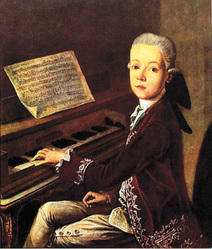 Composer-performers were once the norm.
Composer-performers were once the norm. “Can anyone name a (classical) musician who is both a composer and a performer, and who successfully balances the two activities? And by ‘successfully balances’ I mean someone who is fully accepted as a composer and a performer. It seems to me that this is a hard thing to do – the musical world likes people to be one thing, primarily. And often musicians who try to be both composers and performers find that their efforts in their ‘other’ musical métier are viewed as secondary activities.”
“John Adams is a composer who also conducts; and Stephen Hough is a pianist who also composes.”
My Facebook query generated many responses. But in retrospect, I wish I had inserted the word “famous” or “prominent” into my original question somewhere. As often happens when contemporary music is the topic of conversation, some people proudly brought forward some rather obscure names. I always like to learn of composers who are new to me – especially if it’s possible to check out their music online. (I’m listening to one of them right now on YouTube, as I write these words.) But what I was searching for on this occasion was people who have made it big, and who are regarded as composers and performers equally.
There were also a few big names put forward, worthy of consideration. However, in my opinion, only one of them passed the test with flying colours. I’ll present his case last. And I’ll begin by talking about some of the problematic suggestions.
A couple of respondents mentioned Philip Glass. Certainly, the musical world knows him as a composer. And the musical world also knows him as the leader of his own ensemble, and that he can play arpeggios like nobody’s business. But I think the fact that he almost exclusively plays his own music creates a hierarchical relationship between his composing and his performance. His performing career isn’t really a full-fledged, autonomous thing: it is tied to and dependent on his compositional work. For this reason, I think the world regards him as a composer, primarily – and the same could be said of other many other composers who play their own music.
Another name mentioned was Marc-André Hamelin. To be sure, he is well known as a pianist, and he also composes. I’ve had the pleasure of discussing Hamelin’s compositional activities with him – and I came away with the distinct impression that, as much as he enjoys writing music, composition is sideline for him. (You can read my interview with him here.) He’s not trying to do both equally – and I’m sure this is true of many musicians who are both performers and composers. There’s absolutely nothing wrong with that, but it wasn’t quite what I was after.
It seems that conductors enjoy some special advantages when they turn their hands to composition: they have whole orchestras at their disposal, and they also tend to be influential “power-brokers” in the musical world. So it’s not surprising that several conductors were nominated.
Esa-Pekka Salonen looks like a strong candidate. He seems fully dedicated to both composition and performance, and has successfully projected his intentions to the world. But let’s put his status as a conductor-composer to a stress test. If Salonen were to announce that he has given up composing to devote all his efforts to conducting, would that harm his conducting career? I don’t see why it would. But what about the reverse? What if he said he had retired from conducting to concentrate on composition? I suspect that such a decision would diminish his success as a composer. I can’t prove it, of course – but my hypothetical stress test suggests to me that his compositional career is supported by his conducting. Salonen is first and foremost a conductor.
Conversely, there are some composer-conductors who would, perhaps, run into problems if they stopped composing. Would Thomas Adès, Péter Eötvös or Tan Dun be able maintain active conducting careers if they no longer wrote music? It’s not a move I’d recommend to any of them.
And now we come to the prize-winner: Pierre Boulez. Personally, I don’t much like the man’s music. But I’ve got to hand it to him: he has scaled the heights of his two parallel careers, as both a composer and a conductor – and neither of his two métiers appears to “lean on” the other.
Finally, perhaps I should explain why this question is rattling around in my head at this time. Last week, I interviewed the young Russian pianist Daniil Trifonov, who was passing through town to play a gig with the Toronto Symphony. I knew about his pianistic accolades – major prizes in the Tchaikovsky, Chopin and Rubinstein competitions – before I sat down to talk with him. But I was surprised when he told me he also writes music, and has serious ambitions in this area.
I haven’t heard a note of Trifonov’s music, so I can’t comment on it. But I can’t help wondering if his gold medal win for piano at the Tchaikovsky Competition might not cast a dark shadow over his compositional efforts.
Can Trifonov make a name for himself as both a composer and a performer? I don’t know – but I wish him luck.
© Colin Eatock 2014
 RSS Feed
RSS Feed

